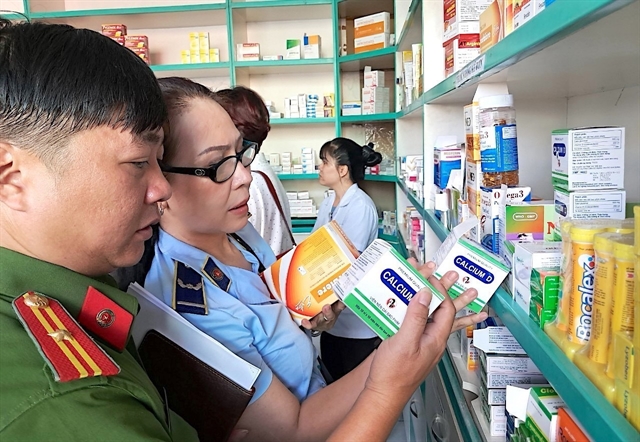 Society
Society

 |
| Authorities inspect a pharmacy in Tân Phú District, HCM City. — VNA/VNS Photo Đinh Thị Hằng |
HÀ NỘI — A revised version of the Law on Pharmaceuticals 2016 will be presented to the National Assembly for discussion and feedback during a legislative meeting from June 17 to 28.
According to the Drug Administration of Vietnam, the version enacts special mechanisms for using medicines and vaccines during a COVID-19 outbreak, ensuring a stable pharmaceutical supply in case of future outbreaks.
Another focus is introducing more robust policies to attract investment, promote research and development in drug manufacturing and accelerate technology transfers in specialised medicines.
Accessibility is also a key theme. The version aims to diversify pharmaceutical supply by establishing a legal framework for pharmacy chains and pharmaceutical sales on e-commerce platforms.
Additionally, it grants pharmaceutical business licences to non-profit pharmaceutical entities that engage in commercial activities to ensure essential medicines reach a wider range of the population.
It also aims to empower foreign-invested enterprises (FIEs) to play a more active role in Việt Nam's medicine supply chains. This includes allowing FIEs to directly distribute pharmaceuticals they have manufactured, contract manufactured, or for which they have transferred technology in Việt Nam.
It also aims to simplify registration procedures by streamlining file extensions, defining scenarios for registration without the Pharmaceutical Registration Advisory Council's and Ministry of Health's approvals, and reducing file processing time from three months to 15 days and licence issuing time from 12 months to nine months.
It also allows continued use of expired drug registration licences if renewal applications have been submitted until renewal or the Ministry of Health's notification is received. This aims to ensure uninterrupted pharmaceutical circulation and prevent supply disruptions.
For fear that the prevalence of registered-but-not-circulated pharmaceuticals could obscure the true picture of drug availability, the version limits the renewal of licences for pharmaceuticals that have not been circulated for five years, except for some types of medicines.
It also decentralises recall authority to provincial Departments of Health for pharmaceuticals with quality issues of level 2 or level 3 within their jurisdiction. This would expedite local recall actions and align with regulations on product quality inspection.
Another focus involves Good Manufacturing Practices (GMP). The version adopts international GMP standards as the basis for evaluating foreign pharmaceutical facilities, ensuring a reliable supply of raw materials for Vietnamese manufacturers.
It also streamlines administrative procedures and reduces certain business requirements to give more elbow room to pharmaceutical enterprises. This includes eliminating confirmation procedures and allowing manufacturers to implement quality management measures based on GMP principles.
It also reinforces pharmaceutical price management by regulating declaration prices and projected wholesale prices to minimise intermediaries.
Procedures for registration of new drugs, brand-name drugs, specialised treatment drugs, biological products, high-tech drugs, and raw materials for drugs produced based on nationally approved scientific and technological tasks, and biotechnological drugs with technology transfer for production in Việt Nam, generic drugs of new drugs whose patent protection is about to expire, as well as traditional medicines produced using high-tech processes and from sources of medicinal herbs meeting GACP-WHO standards, will be streamlined under the new proposed law.
Rare drugs, WHO prequalified vaccines, and drugs that have undergone clinical trials in Việt Nam, will also be granted import licences.
Nguyễn Thanh Lâm, Deputy Director of the Drug Administration of Vietnam, said the Law on Pharmaceuticals 2016 had established a strong regulatory framework for pharmaceuticals for years.
However, the growing demand for high-quality medicines and the emergence of new diseases have exposed the need for revisions to the Law to keep manufacturers up with the times.
"This revised version will address current shortcomings in pharmaceutical management, paving the way for the industry's continued growth and ensuring accessibility to high-quality and affordable pharmaceuticals," said Lâm. — VNS